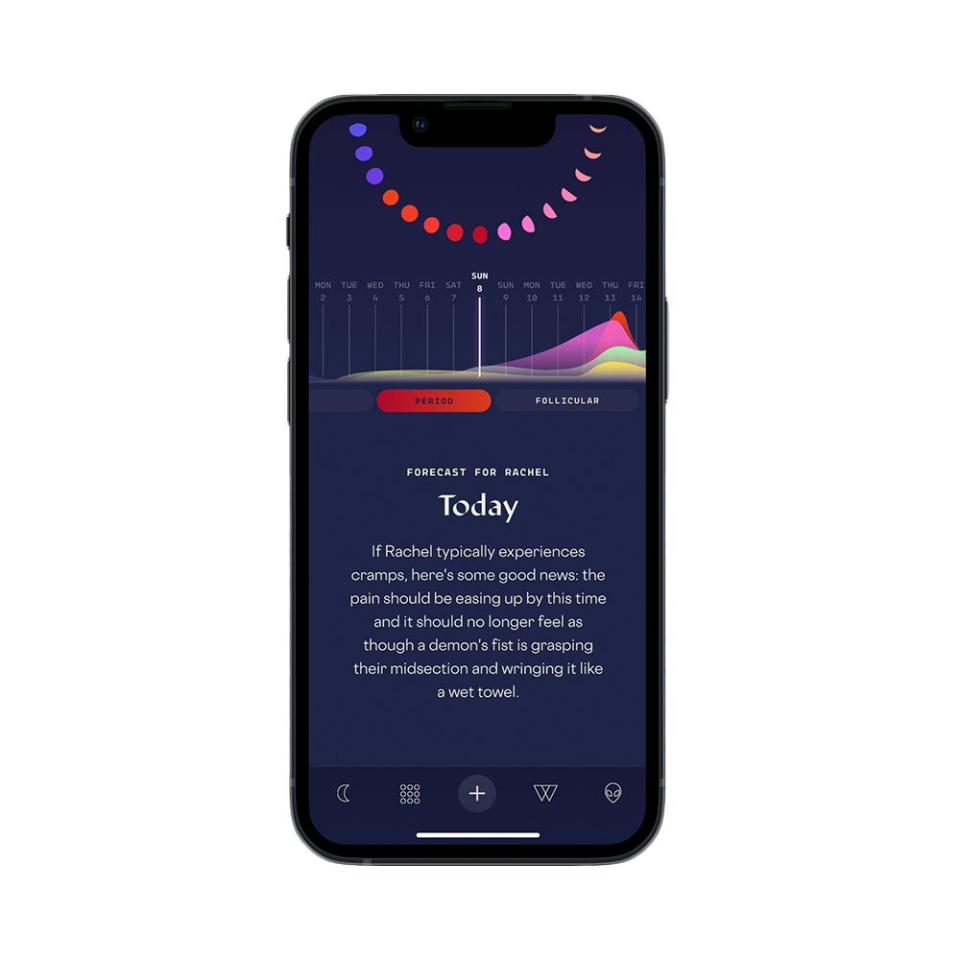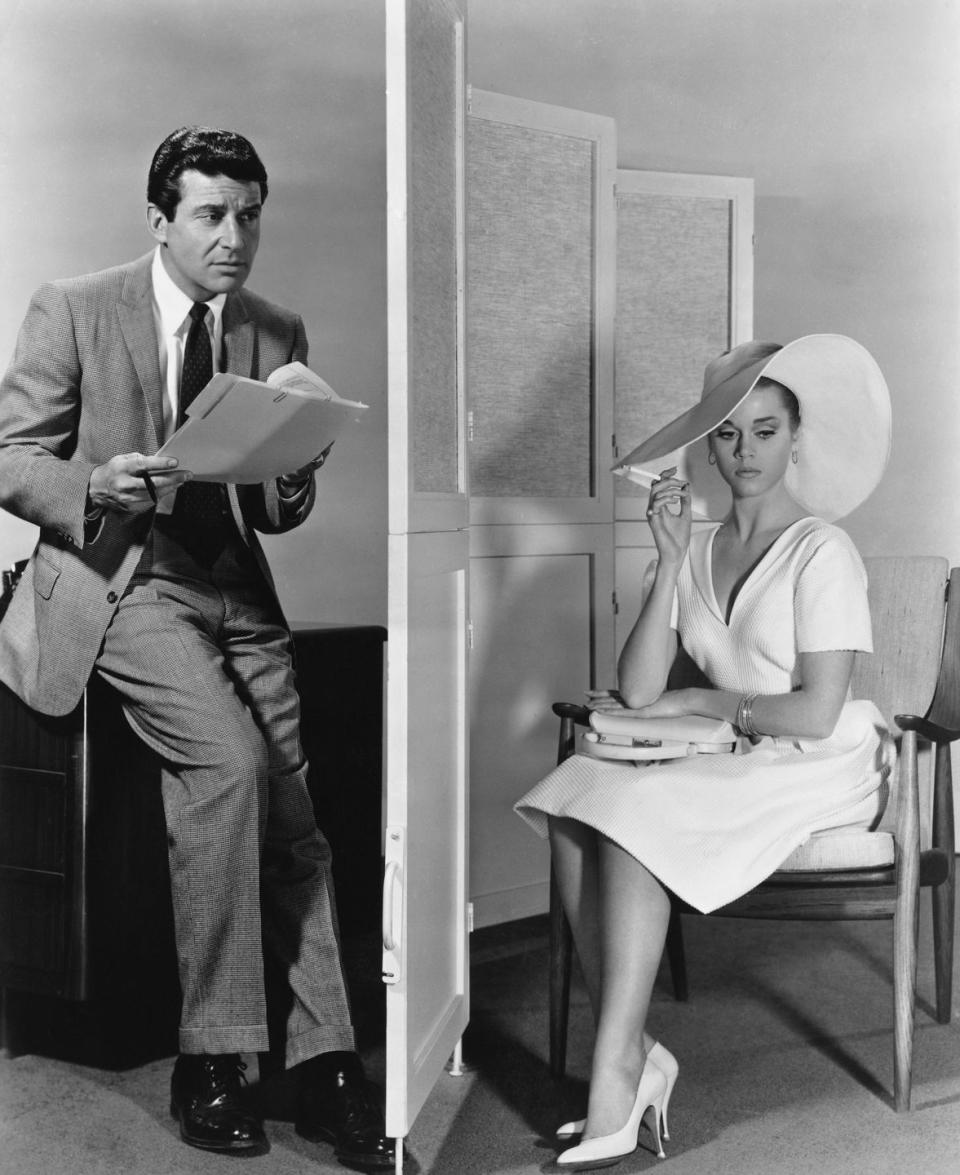They Let Their Partners Track Their Periods, Oddly Everything Got Better

"Hearst Magazines and Yahoo may earn commission or revenue on some items through these links."
When Jamie, 24, arrives at her boyfriend Connor’s Manhattan apartment after work, she doesn’t have to tell him her low energy might be due to spiking progesterone levels.
“He was like, ‘luteal phase,’ when I walked in,” the product manager says.
Ever since the couple signed up for the hormone health app Stardust’s partner feature in the summer of 2023, daily alerts let Connor, 27, in on where Jamie’s at in her cycle.
There is an 88 percent chance that Jamie will desire the following in the next 24 hours: Back Scratches Until She Falls Asleep reads one of the cheeky push notifications Connor might wake up to. And if he doesn’t take the hint, Jamie can also send science-backed requests for flowers or chocolate.
A third of Stardust’s over 1 million users have invited a partner to join them on the gamified feature since it became available in August 2023.

Discouraged by the oversaturated period tracker market dominated by too-pink and too-sexualized products designed by men, CEO Rachel Moranis used her design and architecture background to launch an alternative platform for menstruating mystics with Co-Founder Molly Young, a New York Times book critic in 2020. The company decided to roll out a partner integration on the app, delivering astrological yet educational period forecasts because it was the top requested feature from users. Moranis’ all-woman team wanted the tool for themselves, too. Competitors weren’t offering a partner option without a heteronormative focus on pregnancy or with the notion that makes Stardust fit for the horoscope-obsessed Co-Star crowd.
“We’re all kind of striving for supreme self-care and health and we're in the post-Goop era,” Moranis says over Zoom. “I think we have to go easy on ourselves, and part of taking care of yourself is making fun of it all.”
Despite the increased skepticism of period apps in the wake of Roe v. Wade being overturned in 2022 and the real potential threat of sharing reproductive data in a political climate where abortion is banned in 21 states, the levity, compassion, more open communication, and more treats that sharing cycle information has provided seems to be outweighing the risks for some couples.
Allowing users to track their periods with a partner of any gender, or with multiple partners if they’re non-monogamous, Stardust is taking the guesswork out of hormonal fluctuations for couples like the newly married Angelina, 25, and Diane, 23, in Kaneohe, Hawaii. Keeping up to date on the many phases of each other’s cycles is helping the newlyweds –– one who is employed at a plant nursery and the other an active marine –– stay connected while maintaining different work and travel schedules.
Diane says that not always having to explain why she might be less talkative or affectionate during certain times of the month has lifted a weight off of their shoulders, “I’m not good with words sometimes depending on where I'm in my cycle.” Diane used to go “radio silen[t] a lot,” leaving Angelina in the dark as to why. And Angelina, who feels vindicated now that the app supports her inclination to tell Diane to maybe take it easy at the gym on certain days to support her flow, has also found it easier to express her desire for more physical connection during her own cycle. “There’s been specific times where I've sent a nudge or cast a magic spell about wanting more cuddles,” she says.

Asking for support or help can be more difficult for women, according to New York-based psychotherapist and relationship expert Lisa Brateman. Resources like cycle apps can empower them to get more comfortable with the idea and foster more open communication, a key component of healthy relationships.
“If you don’t share with your partner what your needs are, they can’t read your mind. Your needs will not necessarily be met,” Brateman says. “Whether it’s menstruation or just how you physically feel being a woman or your deepest vulnerabilities, the more you share with your partner, the closer you’re gonna feel.”
While 75 percent of menstruating women experience premenstrual syndrome (PMS), those who don’t suffer debilitating fetal-position-inducing cramps or emotional roller-coasters every 28 days might not see the point in handing over a code to their physiology. But for couples where a partner’s hormonal imbalances and underlying health conditions are more likely to complicate their periods, cycle sharing has made them feel less alone.
Lilly, a 23-year-old massage therapist from Lapel, Indiana, is one of the more than 5 million women in the US dealing with polycystic ovary syndrome (PCOS), the still widely misunderstood leading cause of infertility. As many as 70 percent of cases remain undetected, and when Lilly was first diagnosed, she didn’t receive many resources from her doctor about lifestyle changes to support the chronic condition. She invited her boyfriend of two years, Pierce, a commercial concrete truck driver, 24, to follow her period about five months ago and he was most surprised to see how women’s hormones cycle throughout the month compared to men’s 24-hour windows.

“Having that knowledge for the both of us has given us a better understanding of what I need and what we need to do together to make this process easier,” Lilly says.
The two have noticed the biggest change in how they eat since cycle sharing. In addition to leaning into junk food craving cliches typically associated with monthly hormonal dips, Stardust pulls in a range of period-supportive diet resources ranging from seed cycling to ayurvedic-approved ingredient suggestions.
Pierce sees cooking together around Lilly’s period as mutually beneficial, “I want to be part of everything that she’s going through and how I can do more and be better for what she needs because taking care of her is taking care of us.”

For London-based content creator Sophie, 27, who relies on Stardust to log endometriosis symptoms for doctor appointments, keeping her boyfriend of a year, professional rugby player, Dillon, 27, in the loop sometimes made her feel like a broken record. A self-described “absolute trench of doom,” before her period, learning what might be triggering her behavior has helped Dillon be more mindful of what his girlfriend is going through.
“He is much calmer with me now, whereas before he just didn't understand why I was overreacting to everything,” Sophie says while sitting next to her boyfriend on Zoom. “We can now have a laugh and a joke about how there’s periods where I'm just like, get away from me.”
Hacking when a woman might be most likely to DTF to conceive has historically been the impetus of inviting partners to join period apps, but finding creative ways to forge physical intimacy throughout her cycle was a bonus for Cape Town-based life coach and astrologer Cato, 26. When she added her massage therapist and life coach boyfriend Joe, 43, it allowed him to, “just be present and allow her to be where she's at in her process.
Cato initially joined Stardust to get more in tune with her cycle after removing her IUD but notes that including her partner in the journey made her feel more “held” by him.

“We can cultivate or create or experience intimacy in different ways and not always [by] having penetrative sex, for example,” Cato, who is now pregnant, says. “We knew when we could be very intentional with making love.”
The reason couples may be feeling a stronger sense of closeness isn’t because the app specifically sheds light on menstruation, Brateman explains.
“Couples who share more intimate subjects with their partners generally have a higher level of satisfaction in their relationships than people who don't, who just kind of keep [certain] things off the table,” she says.
But didn’t relationship guru Esther Perel once say, “Love enjoys knowing everything about you; desire needs mystery”? What happens if the oversharing and lack of privacy starts to feel too unsexy, or even unsafe?

If a couple on Stardust breaks up, the person who menstruates can remove their former partner from accessing their data, and block them so they can’t regain access to their account. The app came under scrutiny for its data terms and has since gone to great lengths to protect users by anonymizing personally identifiable information, according to Moranis. While she stands by the claim that her app is “one of the most secure” period trackers, she also cautions people in states where abortion is criminalized against using it.
In terms of mitigating the emotional toll of being this TMI with a partner, Brateman stresses that it’s crucial for users to feel in control of how much and how often they share the details of their reproductive lives. “Once you open that gate, it's hard to walk it back,” the therapist says. As long as the information gleaned from the period tracking apps isn’t weaponized, she still sees benefits to utilizing them as a short-term tool to open up important conversations. Taboos and stigma have made it difficult for people to talk about menstruation for so long, even those who experience it firsthand, and partners could especially use some guidance, “I think it trains them in a way to get conscious about in ways they wouldn't have before. You know, rather than, oh, you must be PMSing, which is always dismissive.”
You Might Also Like

